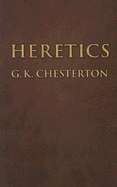Heretics

Resumen del libro
G. K. Chesterton, the "Prince of Paradox," is at his witty best in this collection of 20 essays and articles from the turn of the 20th century. Focusing on "heretics" -- those who pride themselves in their superiority to conservative views -- Chesterton appraises prominent figures from the literary and art worlds who fall into that category. Luminaries such as Kipling, Shaw, Wells, and Whistler come under the author's scrutiny, where they meet with equal measures of his characteristic wisdom and good humor. Observations on the wider world -- including "On Sandals and Simplicity," "Science and the Savages," and "Slum Novelists and the Slums" -- reflect the main themes of Chesterton's work.
Biografía del autor
G. K. Chesterton (Londres 1874 - Beaconsfield 1936), fue un literato y polemista inglés convertido en 1922 al catolicismo. Abandonó sus estudios de arte para dedicarse al periodismo. Comenzó escribiendo poesía y ensayos críticos sobre diversos escritores británicos, pero la fama y el reconocimiento internacional le llegaron con sus novelas y relatos, obras llenas de imaginación, sentido del humor y hábil manejo lingüístico, como El hombre que fue Jueves, El Napoleón de Notting Hill, La esfera y la cruz o los celebérrimos relatos del padre Brown. Escribió, además, dos extraordinarias biografías de santo Tomás de Aquino y san Francisco de Asís, esta última publicada en castellano por Ediciones Encuentro.








